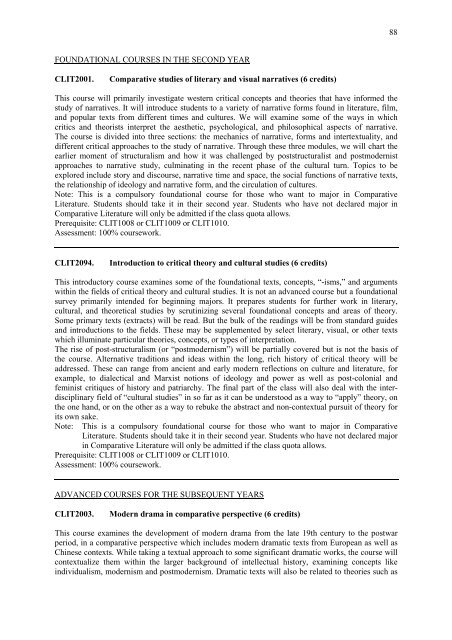(BA) (4-year-programme) - The University of Hong Kong
(BA) (4-year-programme) - The University of Hong Kong
(BA) (4-year-programme) - The University of Hong Kong
You also want an ePaper? Increase the reach of your titles
YUMPU automatically turns print PDFs into web optimized ePapers that Google loves.
88FOUNDATIONAL COURSES IN THE SECOND YEARCLIT2001.Comparative studies <strong>of</strong> literary and visual narratives (6 credits)This course will primarily investigate western critical concepts and theories that have informed thestudy <strong>of</strong> narratives. It will introduce students to a variety <strong>of</strong> narrative forms found in literature, film,and popular texts from different times and cultures. We will examine some <strong>of</strong> the ways in whichcritics and theorists interpret the aesthetic, psychological, and philosophical aspects <strong>of</strong> narrative.<strong>The</strong> course is divided into three sections: the mechanics <strong>of</strong> narrative, forms and intertextuality, anddifferent critical approaches to the study <strong>of</strong> narrative. Through these three modules, we will chart theearlier moment <strong>of</strong> structuralism and how it was challenged by poststructuralist and postmodernistapproaches to narrative study, culminating in the recent phase <strong>of</strong> the cultural turn. Topics to beexplored include story and discourse, narrative time and space, the social functions <strong>of</strong> narrative texts,the relationship <strong>of</strong> ideology and narrative form, and the circulation <strong>of</strong> cultures.Note: This is a compulsory foundational course for those who want to major in ComparativeLiterature. Students should take it in their second <strong>year</strong>. Students who have not declared major inComparative Literature will only be admitted if the class quota allows.Prerequisite: CLIT1008 or CLIT1009 or CLIT1010.Assessment: 100% coursework.CLIT2094.Introduction to critical theory and cultural studies (6 credits)This introductory course examines some <strong>of</strong> the foundational texts, concepts, “-isms,” and argumentswithin the fields <strong>of</strong> critical theory and cultural studies. It is not an advanced course but a foundationalsurvey primarily intended for beginning majors. It prepares students for further work in literary,cultural, and theoretical studies by scrutinizing several foundational concepts and areas <strong>of</strong> theory.Some primary texts (extracts) will be read. But the bulk <strong>of</strong> the readings will be from standard guidesand introductions to the fields. <strong>The</strong>se may be supplemented by select literary, visual, or other textswhich illuminate particular theories, concepts, or types <strong>of</strong> interpretation.<strong>The</strong> rise <strong>of</strong> post-structuralism (or “postmodernism”) will be partially covered but is not the basis <strong>of</strong>the course. Alternative traditions and ideas within the long, rich history <strong>of</strong> critical theory will beaddressed. <strong>The</strong>se can range from ancient and early modern reflections on culture and literature, forexample, to dialectical and Marxist notions <strong>of</strong> ideology and power as well as post-colonial andfeminist critiques <strong>of</strong> history and patriarchy. <strong>The</strong> final part <strong>of</strong> the class will also deal with the interdisciplinaryfield <strong>of</strong> “cultural studies” in so far as it can be understood as a way to “apply” theory, onthe one hand, or on the other as a way to rebuke the abstract and non-contextual pursuit <strong>of</strong> theory forits own sake.Note:This is a compulsory foundational course for those who want to major in ComparativeLiterature. Students should take it in their second <strong>year</strong>. Students who have not declared majorin Comparative Literature will only be admitted if the class quota allows.Prerequisite: CLIT1008 or CLIT1009 or CLIT1010.Assessment: 100% coursework.ADVANCED COURSES FOR THE SUBSEQUENT YEARSCLIT2003.Modern drama in comparative perspective (6 credits)This course examines the development <strong>of</strong> modern drama from the late 19th century to the postwarperiod, in a comparative perspective which includes modern dramatic texts from European as well asChinese contexts. While taking a textual approach to some significant dramatic works, the course willcontextualize them within the larger background <strong>of</strong> intellectual history, examining concepts likeindividualism, modernism and postmodernism. Dramatic texts will also be related to theories such as
















